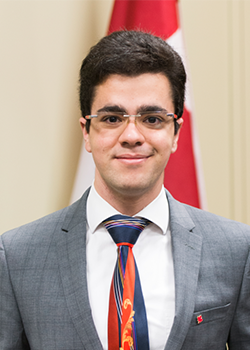Faraj Haddad

For eight years, Faraj Haddad, BSc’17, PhD’21, called Western home. Over that time, he accomplished many things – including completing a PhD in neuroscience – but says the time he spent outside of classes and the relationships he built have left the biggest mark on him.
“I was inspired by a professor to focus on getting the skills I would need to teach at the university level. They were really passionate about teaching,” said Haddad, who is originally from Iraq, but came to Canada as an international student from Dubai after completing high school there.
Haddad chose first to pursue an undergraduate degree in medical sciences at Western. It was while he was pursuing his master’s degree in neuroscience that he became really involved in activities outside of the lab, including joining the Society of Neuroscience Graduate Students, helping to organize an annual conference and co-founding The Dorsal Column, a blog that communicates neuroscience research being done at Western University to the public.
“I found a lot of value outside of classes, as well. There were so many events and activities to get involved in as a volunteer.”
He also became an international peer guide, hoping to offer international students support in their transition to life in Canada and at Western.
“I had a difficult time getting integrated into Western and London in my first year and the Peer Guide program was everything I wish I had in my first year,” said Haddad, who is the program’s longest-serving volunteer, having participated for seven years.
“The main reason I continued is the drive to make a difference in the experience of new students who may be feeling isolated and figuring out all the little things that are part of living in London and in Canada. In my later years as Peer Guide team leader, I really enjoyed mentoring incoming Peer Guides and fostering the wonderful community and family that is the Peer Guide program. Being involved with the program made me realize that I really want to be a mentor,” he said.
Passionate about encouraging students to learn more about science and helping to communicate scientific ideas to others, Haddad is currently working at Western in a position where half of his time is spent helping manage fourth-year courses, which includes supporting students with their assignments and guiding them in the lab.
The other half of his role focuses on education-related projects. One project involves assessing the availability of academic resources at colleges and universities and how access to such resources can help students with their mental well-being.
“For now, I really like what I’m doing. I do see myself leaving Western and the university sector at some point though,” he said. “I’d like to get a position in industry that would give the opportunity to mentor others and work in the field of science communication.”
“I think being a peer guide helped me develop empathy for others. I learned that the same challenges can be experienced in totally different ways by others, and being a peer guide helped me put myself in others’ shoes, which was essential in order to be their guide and mentor.


